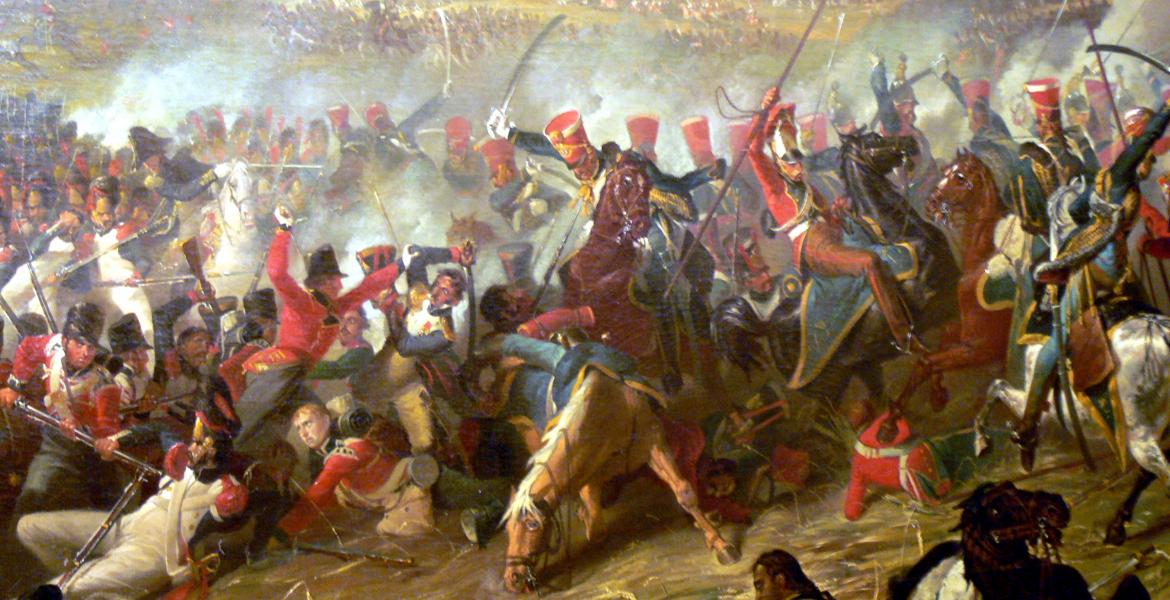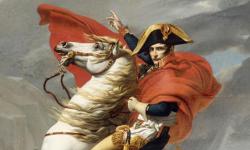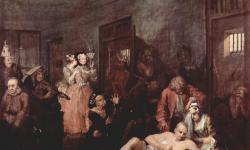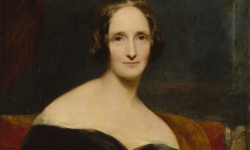The Battle of Waterloo
Key facts about the Battle of Waterloo
- Waterloo was the final battle of the Napoleonic WarsThe Napoleonic Wars lasted from 1803 until 1815 (although some people also include the French Revolutionary Wars in this, which started in 1792 and continued until 1802. The Napoleonic Wars were therefore a continuation of the Revolutionary Wars). A number of European powers fought against the expansionist French Empire. The Napoleonic Wars lasted from 1803 until 1815 (although some people also include the French Revolutionary Wars in this, which started in 1792 and continued until 1802. The Napoleonic Wars were therefore a continuation of the Revolutionary Wars). A number of European powers fought against the…
- It was fought in Belgium on 18 June 1815
- Napoleon (France) was defeated by the Duke of Wellington (Britain), General Blücher (Prussia) and other members of the Seventh CoalitionThe Seventh Coalition fought against the French Empire during the Napoleonic Wars. They included Britain, Russia, Prussia, Sweden, Switzerland, Austria, the Netherlands and several German states. The Seventh Coalition fought against the French Empire during the Napoleonic Wars. They included Britain, Russia, Prussia, Sweden, Switzerland, Austria, the Netherlands and several German states.
- It was a hard-won battle, with thousands on both sides dying and injured
- Wellington said Waterloo was 'the nearest run thing you ever saw in your life'
- After the Battle, Napoleon fled to Paris and eventually surrendered
People you need to know
- Gebhard Leberecht von Blücher - commander of the Prussian army
- Napoleon Bonaparte - a French military and political leader who gained power during the French Revolution and became French emperor. You can read our article on Napoleon here.
- Louis XVI - French monarchA king, queen, or emperor A king, queen, or emperor from the House of Bourbon who was deposed and executed during the French Revolution.
- Louis XVIII - French monarch from the House of Bourbon and brother to the executed king Louis XVI.
- Marshal Ney - French military commander, known by Napoleon as 'the bravest of the brave' during the French Revolutionary and Napoleonic Wars.
- Arthur Wellesley, Duke of Wellington - Field Marshal of the British army and commander of the British-German army.
Background
In 1814, Napoleon Bonaparte abdicated the French throne and was exiled to the island of Elba in the Mediterranean. By February 1815 he'd escaped, thanks to the carelessness of his 'guard', his charisma, and his ability to discern information from his visitors, Immediately following his escape, the British had in fact been accused of aiding him. He had received a constant stream of visitors to his island, many of whom well-connected, who enjoyed gossiping about the politics in Britain and the Coalition countries. Furthermore, his 'guard', Sir Neil Campbell, had been issued with no clear instructions from the British government (in response to a direct request for direction, he'd been told to be a 'British resident in Elba without assuming any further official character'), and had therefore not taken his job seriously, often being absent from the island. before marching on Paris against the newly installed Louis XVIII. Louis fled Paris, and it is said that Napoleon arrived so quickly afterwards that he ate the meal cooked for the King. Those sent against him, such as the French General Marshal Ney, switched to his side, as did a number of old supporters and prisoners of war.
Immediately following his escape, the British had in fact been accused of aiding him. He had received a constant stream of visitors to his island, many of whom well-connected, who enjoyed gossiping about the politics in Britain and the Coalition countries. Furthermore, his 'guard', Sir Neil Campbell, had been issued with no clear instructions from the British government (in response to a direct request for direction, he'd been told to be a 'British resident in Elba without assuming any further official character'), and had therefore not taken his job seriously, often being absent from the island. before marching on Paris against the newly installed Louis XVIII. Louis fled Paris, and it is said that Napoleon arrived so quickly afterwards that he ate the meal cooked for the King. Those sent against him, such as the French General Marshal Ney, switched to his side, as did a number of old supporters and prisoners of war.
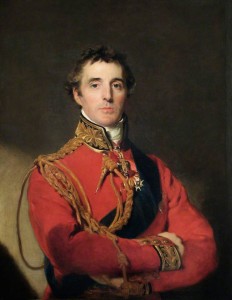
The Seventh Coalition was not expecting Napoleon either to escape or to build support again so quickly. They were caught off guard, and were unable to rally in time: many of Britain’s troops, for example, were still in America after fighting in the War of 1812A confusingly-named war between Britain and the United States, fought between June 1812 and February 1815. A confusingly-named war between Britain and the United States, fought between June 1812 and February 1815. . Rather than leading the best of his men, such as the elite Peninsular Army, the Duke of Wellington commanded a hastily mobilized force made up of boys, new recruits and retired veterans. Wellington was not impressed with his soldiers, calling them 'scum of the earth' and 'fellows who have all enlisted for drink'.
The Prussian army, led by General Blücher, was defeated at Ligny on 16 June 1815 before it could meet with the British and Dutch. In response, and having suffered in their own skirmishes, the British withdrew to a ridge above the small Belgian village of Waterloo, harried all the way by the French and pounding rain. Despite the extreme discomfort and misery of spending the day and night in the open during a storm, the British took this as a good omen. There had been storms on the eve of their victories at Vittoria, Salamanca, and Fuentes de Onoro. The withdrawal could well have been tactical. Wellington had been in the same area a year previously, and had noticed a particular ridge which he thought would be the perfect place for a battle, should the need arise. Napoleon caught up with him shortly after. With battle lines drawn, Napoleon hoped to defeat the British and her allies before the remaining Prussian army could meet them, bringing supplies and men.
Despite the extreme discomfort and misery of spending the day and night in the open during a storm, the British took this as a good omen. There had been storms on the eve of their victories at Vittoria, Salamanca, and Fuentes de Onoro. The withdrawal could well have been tactical. Wellington had been in the same area a year previously, and had noticed a particular ridge which he thought would be the perfect place for a battle, should the need arise. Napoleon caught up with him shortly after. With battle lines drawn, Napoleon hoped to defeat the British and her allies before the remaining Prussian army could meet them, bringing supplies and men.
The Battle of Waterloo
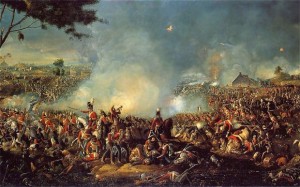
It rained heavily on the night of 17 June 1815, turning the battlefield into a giant muddy puddle. This was part of the global weather event caused by the 1815 eruption of Mount Tambora, which caused extreme cold and wet conditions until 1817 Napoleon, fearing for his cavalryPeople fighting on horseback, who were therefore more mobile than foot soldiers. In modern warfare, the cavalry are those fighting in armoured vehicles. People fighting on horseback, who were therefore more mobile than foot soldiers. In modern warfare, the cavalry are those fighting in armoured vehicles. horses in the heavy mud, delayed the battle until the ground dried, but every minute brought Blücher closer. In the end, the battle started in the late morning
This was part of the global weather event caused by the 1815 eruption of Mount Tambora, which caused extreme cold and wet conditions until 1817 Napoleon, fearing for his cavalryPeople fighting on horseback, who were therefore more mobile than foot soldiers. In modern warfare, the cavalry are those fighting in armoured vehicles. People fighting on horseback, who were therefore more mobile than foot soldiers. In modern warfare, the cavalry are those fighting in armoured vehicles. horses in the heavy mud, delayed the battle until the ground dried, but every minute brought Blücher closer. In the end, the battle started in the late morning No-one is entirely sure when the battle started: some say 10.00 and others say 11.30 and lasted for maybe 12 hours. But cavalry wasn't the only thing affected by the rain: many of Napoleon's heavy cannons sank so deeply into the mud they couldn’t be used. To make matters worse for the French, Napoleon was suffering with terrible haemorrhoids, which prevented him from staying in the saddle all day. With the French commander often absent from the battlefield, his usual intelligence and strategic ability were lacking.
No-one is entirely sure when the battle started: some say 10.00 and others say 11.30 and lasted for maybe 12 hours. But cavalry wasn't the only thing affected by the rain: many of Napoleon's heavy cannons sank so deeply into the mud they couldn’t be used. To make matters worse for the French, Napoleon was suffering with terrible haemorrhoids, which prevented him from staying in the saddle all day. With the French commander often absent from the battlefield, his usual intelligence and strategic ability were lacking.
However, C.S. Forester has argued that Napoleon wasn't necessarily the military genius that his reputation suggests, pointing to the fact that Napoleon didn't change his strategy to suit his opponents, and was unable to learn from defeats. This, Forester says, is the real reason he lost at Waterloo. On the other hand, David Gates argues that his ability to reorganise an army into easier to control and mobilise corps transformed the size of armies and the scale of operations they could undertake. As such, he changed the nature of warfare. It wasn't all bad for the French, nor all good for the Allies. The tired and muddied Allied force was not the best, and their inexperience showed, with the Belgians hastily retreating during French onslaughts and creating gaps along the line. By late afternoon, Wellington observed that 'men were going down like ninepins' thanks to intense bombardment by the French. Without reinforcements from the Prussians, the situation did not look good: 'Give me night or give me Blücher', he prayed. The heavy rain had also not been kind to the Allies, worsening the condition of the roads which delayed the Prussians further. Although Wellington was later to downplay the importance of the Prussians, he said the was 'the nearest run thing you ever saw in your life'.
The heavy rain had also not been kind to the Allies, worsening the condition of the roads which delayed the Prussians further. Although Wellington was later to downplay the importance of the Prussians, he said the was 'the nearest run thing you ever saw in your life'.
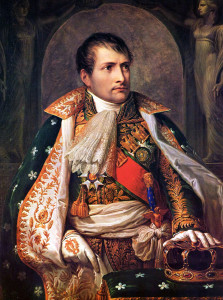
The elite French force, the Imperial Guard, were sent into battle late in the day, as a last attempt to break the Allies before reinforcements arrived. Once again, though, the line held firm and the Imperial Guard were forced to retreat - the only time this had happened. It has been argued by some, such as Michael Barthorp, that this delay lost Napoleon the battle. Wellington sounded the advance to pursue the retreating Guard just before the mass of Blücher’s army arrived to attack Napoleon's rear and flank from the east.
It has been argued by some, such as Michael Barthorp, that this delay lost Napoleon the battle. Wellington sounded the advance to pursue the retreating Guard just before the mass of Blücher’s army arrived to attack Napoleon's rear and flank from the east. The Prussians had been arriving piecemeal during the day, filling gaps where necessary. By nightfall, the battle was won. But Waterloo was something of a Pyrrhic victoryA victory that is so costly in terms of men and resources that it seems no different from losing. It comes from King Pyrrhus of Epirus, who was fighting against the Romans in the Pyrrhic Wars (c.280BCE). Pyrrhus is supposed to have said 'If we are victorious in one more battle with the Romans, we shall be utterly ruined' (Plutarch, Life of Pyrrhus, 21:8). A victory that is so costly in terms of men and resources that it seems no different from losing. It comes from King Pyrrhus of Epirus, who was fighting against the Romans in the Pyrrhic Wars (c.280BCE). Pyrrhus is supposed to have said 'If we are victorious in one more battle with the Romans, we… :
The Prussians had been arriving piecemeal during the day, filling gaps where necessary. By nightfall, the battle was won. But Waterloo was something of a Pyrrhic victoryA victory that is so costly in terms of men and resources that it seems no different from losing. It comes from King Pyrrhus of Epirus, who was fighting against the Romans in the Pyrrhic Wars (c.280BCE). Pyrrhus is supposed to have said 'If we are victorious in one more battle with the Romans, we shall be utterly ruined' (Plutarch, Life of Pyrrhus, 21:8). A victory that is so costly in terms of men and resources that it seems no different from losing. It comes from King Pyrrhus of Epirus, who was fighting against the Romans in the Pyrrhic Wars (c.280BCE). Pyrrhus is supposed to have said 'If we are victorious in one more battle with the Romans, we… : The phrase comes from a battle fought between King Pyrrhus of Epirus and the Romans at Asculum in 279BCE as part of the Pyrrhic War for control of Magna Graecia. According to Plutarch, on being congratulated on his victory, Pyrrhus replied 'If we are victorious in one more battle with the Romans, we shall be utterly ruined.' Napoleon suffered 41,000 casualties; the British, Prussians and their allies suffered 24,000. Half of the staff officers in Wellington's immediate entourage were killed or wounded. As Wellington said, 'They pommelled us and we pommelled them. We pommelled the hardest, and so we won.'
The phrase comes from a battle fought between King Pyrrhus of Epirus and the Romans at Asculum in 279BCE as part of the Pyrrhic War for control of Magna Graecia. According to Plutarch, on being congratulated on his victory, Pyrrhus replied 'If we are victorious in one more battle with the Romans, we shall be utterly ruined.' Napoleon suffered 41,000 casualties; the British, Prussians and their allies suffered 24,000. Half of the staff officers in Wellington's immediate entourage were killed or wounded. As Wellington said, 'They pommelled us and we pommelled them. We pommelled the hardest, and so we won.'
Aftermath
While the Battle of Waterloo was decisive, victory didn’t end the war and skirmishes still lay ahead. After the battle, Napoleon fled the field and returned to Paris, where he found popular opinion had turned against him. With the Coalition forces closing around him, he announced his abdicationRenouncing the throne. Renouncing the throne. on 22 June in favour of his son. This was not enough for the Allies, who feared he would retain some control through his son and so sought to restore Louis XVIII to the throne. The final skirmishSmall and unplanned bouts of fighting. Small and unplanned bouts of fighting. between Blücher and the French (led by Napoleon’s minister for war) was at Issy on 2 and 3 July 1815. This had been the last attempt by the French to defend Paris and, after it failed, a unilateralAn action or decision performed by or affecting only one person, group, or country, without the agreement of the others. An action or decision performed by or affecting only one person, group, or country, without the agreement of the others. ceasefire was given. Negotiators met at the Palace of St Cloud where the French officially surrendered. Napoleon, meanwhile, left Paris and made his way to Rochefort, believed to be heading for America. America had remained sympathetic to the principles of the French Revolution throughout. Finding all ports blockaded by the British, he was left with little choice but to claim asylum. On 15 July 1815, almost a month after his defeat at Waterloo, Napoleon turned himself over to Captain Frederick Maitland, commander of HMS Bellerophon.
America had remained sympathetic to the principles of the French Revolution throughout. Finding all ports blockaded by the British, he was left with little choice but to claim asylum. On 15 July 1815, almost a month after his defeat at Waterloo, Napoleon turned himself over to Captain Frederick Maitland, commander of HMS Bellerophon.
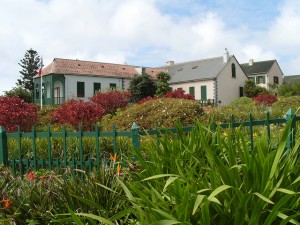
Having caught him, the British were at a loss as to what to do with him. Napoleon had hoped for a quiet retirement on a British estate, whilst the Prussians wanted him executed. He couldn't be declared a prisoner of war, as then he would have to have been released at the end of hostilities. While the British government dithered, Napoleon remained on the Bellerophon, now in Plymouth. The British, themselves fearful of a revolution inspired by Napoleon in their own land, eventually settled on exiling Napoleon to St Helena, a remote island in the South Atlantic that was owned by the East India CompanyA monopolistic company formed to engage in trade with Southeast Asia and India.. Britain’s actions in this were unquestionably illegal, which they well knew: the Lord Chancellor, Lord Eldon, felt he couldn’t even put his seal to the September 1815 Convention confirming it. Instead, they worked on ‘the law of self-preservation’.
Britain’s actions in this were unquestionably illegal, which they well knew: the Lord Chancellor, Lord Eldon, felt he couldn’t even put his seal to the September 1815 Convention confirming it. Instead, they worked on ‘the law of self-preservation’.
Napoleon lived out the rest of his days on St Helena, lonely and not particularly well treated. He died six years later, in what could be called mysterious circumstances. Stomach cancer was suggested at the time, which the British embraced as they didn't want his ill treatment to be the obvious cause of death. The autopsy had found a stomach ulcer, although the report was never signed by the person conducting it. However, a review of the diaries of Napoleon's valet has suggested arsenic poisoning as the cause of death. Many have wondered whether it was deliberate, although analysis of his hair throughout his life has shown high levels of arsenic, which suggests it was an unintentional build up over time.
The autopsy had found a stomach ulcer, although the report was never signed by the person conducting it. However, a review of the diaries of Napoleon's valet has suggested arsenic poisoning as the cause of death. Many have wondered whether it was deliberate, although analysis of his hair throughout his life has shown high levels of arsenic, which suggests it was an unintentional build up over time.
Analysis
Waterloo is considered the deciding point of the Napoleonic Wars. This would suggest that the outcome of the Wars depended on the outcome of the battle. However, it is unlikely that Napoleon could ever have won the war, even if he had won the battle. Leaving aside the misfortunes with the weather and his health, Napoleon was not in a good position. Although there were issues with the Coalition’s troops, they still vastly outnumbered Napoleon’s: there were 118,000 from Britain, Prussia and their allies against 73,000 for Napoleon. Furthermore, there was such a grand coalition against Napoleon by June 1815 that, at some point, he had to lose. Over the previous five years, Britain had practised what the French termed ‘Anglo-Saxon encirclement’, with Britain managing to establish and hold a coalition containing many factions, based on heavy diplomacy and a number of ‘subsidies’: Portugal, Sweden, Prussia, Russia and the Habsburg dynastyA line of hereditary rulers of a country, business, etc. all received over £1,000,000 a year each from Britain. By the Battle of Waterloo, any victories obtained by the French would merely have delayed the inevitable conclusion.
Over the previous five years, Britain had practised what the French termed ‘Anglo-Saxon encirclement’, with Britain managing to establish and hold a coalition containing many factions, based on heavy diplomacy and a number of ‘subsidies’: Portugal, Sweden, Prussia, Russia and the Habsburg dynastyA line of hereditary rulers of a country, business, etc. all received over £1,000,000 a year each from Britain. By the Battle of Waterloo, any victories obtained by the French would merely have delayed the inevitable conclusion.
Things to think about
- Was the Coalition's victory down to Wellington?
- Could Napoleon have won the Battle of Waterloo if luck had been on his side?
- Could Napoleon ever have won the Napoleonic Wars?
- What should the British have done with Napoleon once he was captured?
- What caused Napoleon's death?
Things to do
- Visit Wellington's house in London, Apsley House (also known as Number 1, London), which is now owned by English Heritage. You can find out more information here.
- For those with a bit more time and money, it is possible to visit the battlefield and the Wellington Museum in Waterloo, Belgium. More information and tickets can be found here.
Further reading
Dan and Peter Snow have produced a book on Waterloo for its 200th anniversary, called The Battle of Waterloo Experience. It is short but reasonably unbiased, and it is possible to practice your French and palaeographyThe study of old handwriting. The study of old handwriting. with a collection of facsimile documents included in the book. Bernard Cornwell, famous for his Sharpe series, has written a factual book on Waterloo based on his research for the fictional series, which is exceptionally well-written although not academic.
- Log in to post comments


